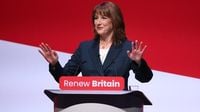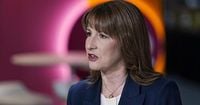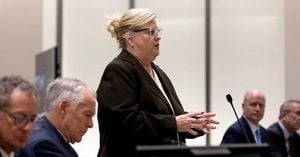Rachel Reeves, the UK’s first female Chancellor of the Exchequer, stood before Labour’s annual party conference in Liverpool on September 29, 2025, facing a nation on edge about its economic future. Her message was clear: the government is approaching a crossroads, and the choices ahead—especially in the upcoming November 26 Budget—will not be easy. With global headwinds howling and domestic pressures mounting, Reeves delivered a speech that both reassured and warned, hinting at the likelihood of tax rises while underscoring Labour’s commitment to economic stability and social progress.
“We’re not immune to any of those things,” Reeves told the BBC ahead of her address, referencing the wars in Europe and the Middle East, U.S. tariffs, and the rising global cost of borrowing. “I wish it wasn’t so, but I am Chancellor in the world as it is, not the world that I might wish it to be.” According to BBC, Reeves emphasized that while the government would strive to keep taxes, inflation, and interest rates as low as possible, “the world has changed” in the last year—making tough decisions unavoidable.
Pressed on whether she would have to raise taxes, Reeves held firm on Labour’s manifesto commitments, particularly on VAT and income tax. “The manifesto stands, and it stands for a reason,” she told ITV’s Good Morning Britain. However, she also left the door open to other tax increases, explaining, “It’s very important that we maintain those commitments to economic stability because we rely on people to buy Government debt to be able to finance the things that we’re doing as a country.” The Chancellor’s measured words prepared the ground for what many economists anticipate will be a difficult Budget, with significant tax rises or spending cuts required to meet her self-imposed borrowing rules.
The economic backdrop is daunting. Despite the UK boasting the fastest growth among G7 countries in the first half of 2025, the Office for Budget Responsibility (OBR) forecasts expansion of less than 1.5% for the year. Inflation is expected to hit 4% in September—double the Bank of England’s target—and government borrowing costs remain elevated, with 30-year gilt yields reaching their highest since 1998. Reeves cited these factors, along with the global uncertainty and potential productivity downgrades from the OBR, as reasons why the fiscal outlook has darkened.
Reeves’s first budget, less than a year ago, was historic for its scale, introducing the largest tax increases in three decades. Yet, as Free Malaysia Today noted, further rises—possibly almost as large—are expected in the November Budget, raising concerns among employers and households alike. Still, Reeves was adamant: “I’m determined not to increase those key taxes that working people pay,” she said, reiterating her pledge to protect ordinary earners from additional burdens.
Within Labour’s own ranks, the Chancellor faces pressure from the left to increase spending, particularly to alleviate child poverty. Many MPs have called for the abolition of the two-child benefit cap, a move estimated to cost £3.5 billion annually. Reeves signaled that this issue will be addressed in the Budget, stating, “We will reduce child poverty, but we’ve also got to make sure the numbers add up, and people can trust me to ensure that that always happens.” She pointed to the government’s achievements so far, including free school meals, breakfast clubs, and increases to both the national living wage and minimum wage, as evidence of Labour’s commitment to supporting families.
Yet, not all criticism has come from within Labour. Andy Burnham, the Labour mayor of Greater Manchester, has been a vocal critic, suggesting ministers are “in hock to the bond markets” due to the government’s strict fiscal rules. Reeves responded pointedly in her speech: “There are still those who peddle the idea that we could just abandon economic responsibility and cast off any constraints on spending. They are wrong—dangerously so—and we need to be honest about what that choice would mean.” Her remarks were widely interpreted as a rebuke to Burnham and others advocating for looser fiscal discipline.
Reeves also turned her attention to the opposition, dismissing the Conservatives as “an irrelevance” but repeatedly reminding delegates, “Don’t ever let anyone tell you that there’s no difference between a Labour government and a Conservative government.” She was less dismissive of Reform UK, the populist party that has recently surged in opinion polls. “The single greatest threat to the way of life and to the living standards of working people is the agenda of Nigel Farage and the Reform Party,” she declared. She criticized the party’s immigration policy as “racist,” though she acknowledged, “you can support the Reform party and not be racist.” Her comments aimed to draw a sharp contrast between Labour’s inclusive approach and Reform UK’s more divisive rhetoric.
Despite the tough talk and challenging forecasts, Reeves’s speech was not without optimism. She announced a series of new initiatives designed to support young people and restore public trust in government. Chief among these was a guarantee of paid work for any young person who has been out of employment or education and receiving Universal Credit for 18 months. Those who refuse such offers without a reasonable excuse risk losing their benefits. “I’m proud of what we’ve done,” she told BBC Breakfast. “I’m the first to admit there’s more to do.”
Other announcements included funding a library in every primary school in England by the next election, establishing a new “hit squad” of investigators to recover money lost to Covid fraud, introducing legislation to ensure ships and steel are British-made, and pushing ahead with the long-promised Northern Powerhouse Rail project. These pledges, though ambitious, were presented as achievable steps towards a fairer and more resilient society.
Reeves’s candor about the challenges ahead was met with both support and skepticism. Her speech received standing ovations from delegates, even as a protester holding a Palestinian flag interrupted her remarks. Reeves handled the disruption with composure, telling the heckler, “We understand your cause and we are recognising a Palestinian state. But we are now a party in government, not a party of protest.”
Reflecting on her first year in office, Reeves admitted it had not been easy. A tearful appearance in the Commons earlier in 2025 had sparked questions about her future, but she insisted, “I am genuinely loving this job and the chance to serve, because that’s what I came into this for—just the chance to serve and make our country a bit better off.”
As the November Budget approaches, the UK awaits the Chancellor’s next move with a mix of anxiety and hope. Reeves’s message is unmistakable: the coming months will require sacrifice, honesty, and a steady hand. Whether Labour can balance fiscal caution with social ambition remains to be seen, but for now, the Chancellor is determined to chart a path through the storm.






